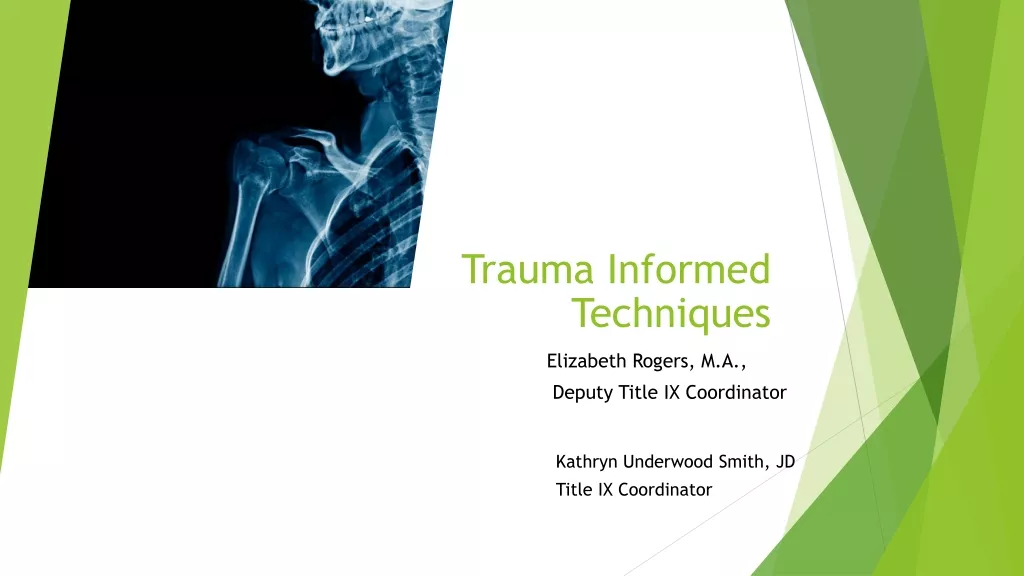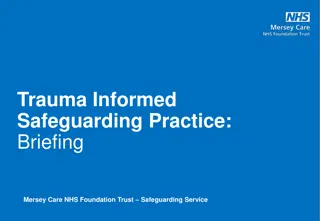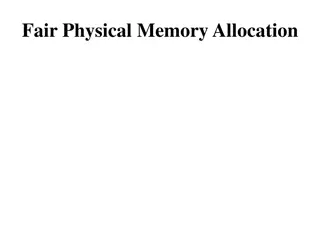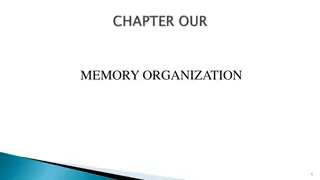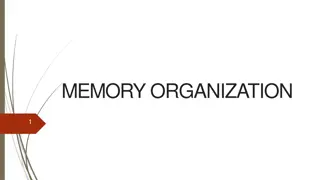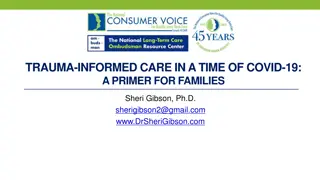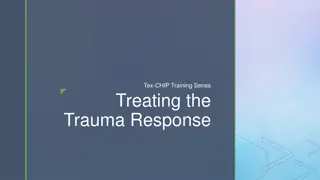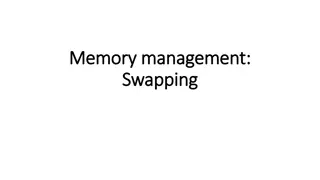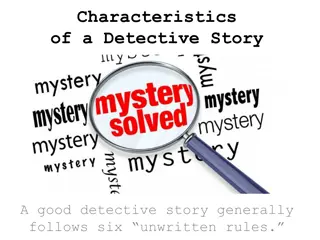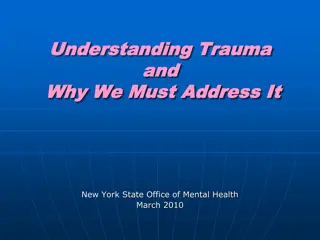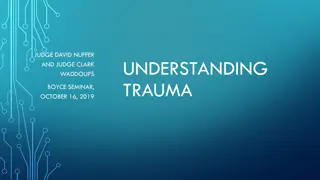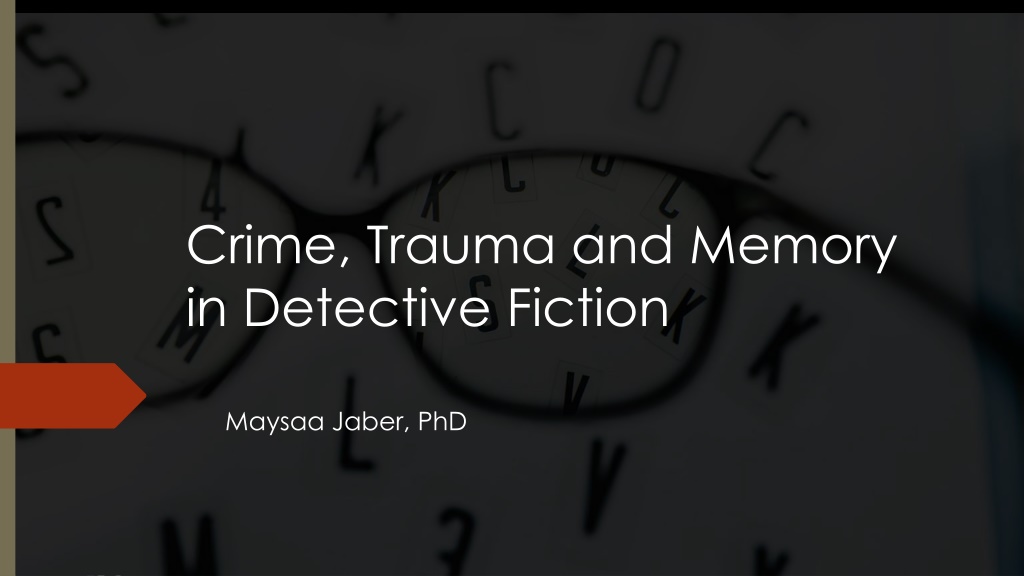
Detective Fiction, Trauma, and Memory Exploration
Delve into the intricate relationship between crime, trauma, and memory in detective fiction, analyzing how characters grapple with inner struggles while solving mysteries. Explore the psychological depths of trauma theory and its impact on the crime narrative, shedding light on the complexities of the modern detective's psyche.
Download Presentation

Please find below an Image/Link to download the presentation.
The content on the website is provided AS IS for your information and personal use only. It may not be sold, licensed, or shared on other websites without obtaining consent from the author. Download presentation by click this link. If you encounter any issues during the download, it is possible that the publisher has removed the file from their server.
E N D
Presentation Transcript
Crime, Trauma and Memory in Detective Fiction Maysaa Jaber, PhD
Alone, bitter, violent, complicated, emotional, broken, traumatized All of these adjectives describe the modern detective as well his world as he seeks to solve crimes and establish order in many crime novels and thrillers especially in hardboiled detective fiction.
The Detective The detective, in modern literature, is stereotyped into the role of the outsider. He embodies all of the attributes that equate to power in American society. However, as the hardboiled detective, he does not fit in the cookie cutter mold of the police officer, nor is he an average member of society. The hardboiled detective lingers outside all areas of community and only attempts to integrate himself on his own terms
Crime = Violence = Chaos = Trauma Memory AND Trauma shape the Crime Narrative
Trauma Sigmund Freud defined trauma as a wound inflicted not upon the body but upon the mind. trauma is described as a foreign body an inoperable bullet in the person s psyche.
Trauma theory A theory of traumatic memory was developed by Breuer and Freud in Studies on Hysteria. This was again developed in DSM-III in 1980 with the introduction of posttraumatic stress disorder (PTSD), where traumatic memory was conceptualized as a core of this syndrome.
Trauma Theory and Memory Caruth defines trauma as an [event] experienced too soon, too unexpectedly, to be fully known and is therefore not available to consciousness until it imposes itself again repeatedly, in the nightmares and repetitive acts of the survivor (1996: 4). Caruth sdefinition traces back to Freud s earliest concept of the latency of trauma, first discussed in 1895 (Freud and Breuer 2000: 174). Trauma is not intrinsically about the traumatic event, which according to Caruth and Freud is not fully integrated by the survivor into consciousness, but refers to the symptoms caused by the event (Visser 2011: 271).
Symptoms Symptoms can vary from hyperarousal of the nervous system, intrusion of repetitive thoughts and memories to numbing responses such as addiction, self-harm and dissociation. Consequent behaviours ranging from withdrawal to outbursts can sever connections with other human beings (Herman 1992).
What happens to the memory of a crime ? The conflict between knowing and not knowing, speech and silence, remembering and forgetting, is the central dialectic of psychological trauma. This conflict is manifest in the individual disturbances of memory, the amnesias and hypermnesias, of traumatized people. It is manifest also on a social level, in persisting debates over the historical reality of atrocities that have been documented beyond any reasonable doubt.
Trauma, memory and suffering For Caruth, people suffering through traumas, like the detective, have an understanding of the world that the rest of society cannot even begin to comprehend. Caruth writes, Psychic trauma involves intense personal suffering, but also involves the recognition of realities that most of us have not begun to face, (Caruth, vii).
Traumatic memories Traumatic memories are fragmented splinters of inchoate and indigestible sensations, emotions, images, smells, tastes, thoughts, and so on (Levine 7).
Traumatic memories According to van der Kolk and van der Hart, [t]raumatic memories are the unassimilated scraps of overwhelming experiences, which need to be integrated with existing mental schemes, and be transformed into narrative language. in order for this to occur successfully the traumatized person has to return to the memory often .... (1995: 176).
Testimony : Dori Laub According to Dori Laub, in his essay Truth and Testimony: The Process and the Struggle there are two levels at which a traumatized person needs to be a witness and needs to have another outside of themselves witness their stories. With the detective, the second level of witnessing is often times fulfilled by the reader. Laub demarcates the three types writing, being a witness to oneself within the experience, the level of being a witness to the testimonies of others, and the level of being a witness to the process of witnessing itself, (Laub, 61)
Memory and Crime narratives Memory is linked to narrative at the most basic level; what witnesses remember are the elements of what we know that assist the detective s reconstruction of criminal events.
Memory and Detective Fiction There is a complexity of memories after trauma, In Crime narratives the characters sense of reality is manipulated and one of the best ways to do this is by disrupting their memory. memory and amnesia as evolving tropes and narrative devices in the genre and will then link these ideas to how historical memory specifically is explored by authors
Memory and Detective Fiction As approach how we remember it , our first consideration is simply whether memories are reliable or unreliable. The adaptability of the crime genre and the pressure to develop novel approaches means there is a constant assimilation of new knowledge and ideas which find expression in explorations of all permutations of memory from total recollection to amnesia
With the detective, the reader often fulfills second level of witnessing. Many times the detective works through his story of trauma, or his own personal history to the reader, the most external being to him and from whom he cannot receive a response or validation.
Philip Marlowe The ultimate hardboiled detective For Marlowe, trauma intensely binds itself to memory and gaining access to those memories is not often straightforward The detective strives toward presenting himself as a hero in a broken, disjointed world. However, he finds it devastating to live in the world he perceives around Marlowe s work makes him a fixer and seeks the answers to questions that seem the most obscure.
Before I go to Sleep by SJ Watson In this bestselling psychological thriller, Christine has no memory of her identity and past, and when she goes to sleep, her memory of the prior day is completely erased
Find Me by Alafair Burke A woman is found after being thrown from an overturned vehicle, not knowing her own identity again, much like Jason Bourne. Fifteen years later, her amnesia has still not recovered and then she vanishes without a trace.
In the Woods by Tana French Two years ago, Liv developed a memory disorder in which all new memory is erased every time she goes to sleep similar to Christine in Before I Go To Sleep. Now Liv has woken up to find a bloody knife hidden in her pocket, and she thinks she may be responsible for a murder. Again, not medically accurate, but certainly a great setup for a thriller, and watching Liv unravel this mystery makes the reader feel like we re along for the ride.


